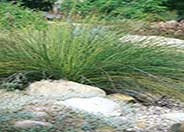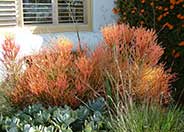
Common name:Small Cape Rush
Botanical name:Chondropetalum tectorum
Chondropetalum tectorum has 3'-4' tall stems that shoot out in all directions from the roots. Each stem has papery bracts connected to the ends that turn from tan to dark drown, then fall off. Chondropetalum can grow in marshes, in the ground with regular watering, or in drought conditions.

Common name:Yellow Stalked Bulbine
Botanical name:Bulbine frutescens
Bulbine frutescens is an evergreen perennial that grows 1' in height and 1'-3' in spread. The leaves are narrow and long. This low- spreading plant is attractive year round.

Common name:Sticks on Fire Pencil Tree
Botanical name:Euphorbia tirucalli 'Sticks on Fire'
In frost free areas, Euphorbia can become a 30' tree but in colder areas, it is often knocked back by frost. It can be single or multiple trunked. It has green cylindrical branches that are about the diameter of a pencil. Leaves are not usually present. Some people are allergic to the sap. It is tolerant of salt, full sun, part shade and quite drought resistant. It is a great accent plant for a container. This form has yellow or orange branches if in full sun.

Common name:Hen and Chicks
Botanical name:Echeveria X 'Imbricata'
This succulent perennial is very small, growing only 2"-3" high. It produces orange, pink, and red blooms and does best in full sun and moist soil.

Common name:Fox Tail Agave, Velvet Agave
Botanical name:Agave attenuata
This Agave has a dramatic tropical form. Even light frost can damage its succulent leaves. It is great for containers. In the low desert, partial sun will be best. If it becomes top heavy, simply cut and stick in the ground to root. It is not a fast grower and has light green foliage. It will also die after flowering but pups around the mother will survive. Distinctive with its large rosette of leaves perched on a long curving trunk, it is a native from Mexico.
Permeable Surfaces
If you have impermeable paving that you would like to make permeable, there are two main methods for doing so:
1. Break up hard paved surfaces to create spaces for water to seep through.
2. Remove and replace the surfaces with permeable paving.
Click in the green box for more information
| Designer: | Exotica |
Photographer: GardenSoft |
Soils and Compost:
Incorporate compost 6" into your soil to retain water, reduce compaction, feed earthworms, and provide valuable nutrients to your plants.
Water Saving Tip:
Mulching and adding compost to soil can minimize evaporation and help soil absorb and store water.
Integrated Pest Management:
Remove irrigation water and fertilizer from areas where you don't want weeds to grow.
